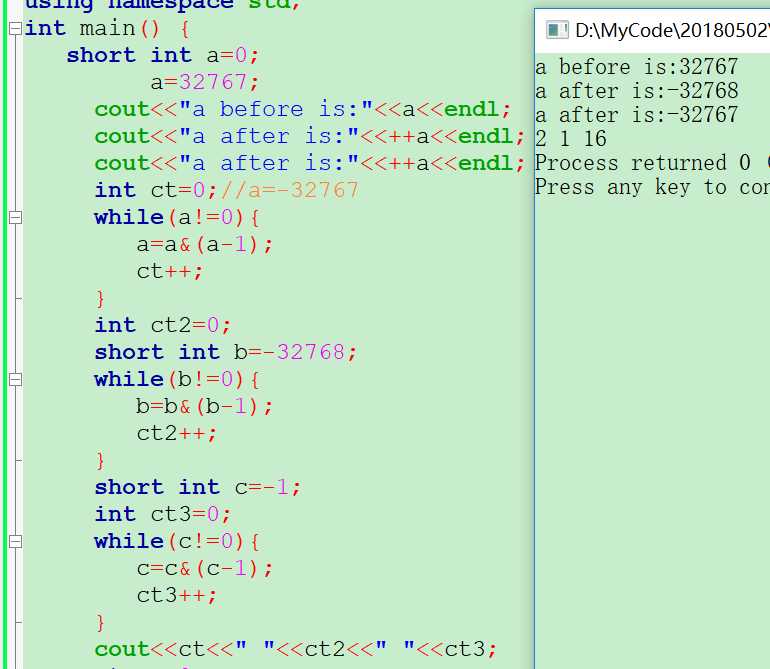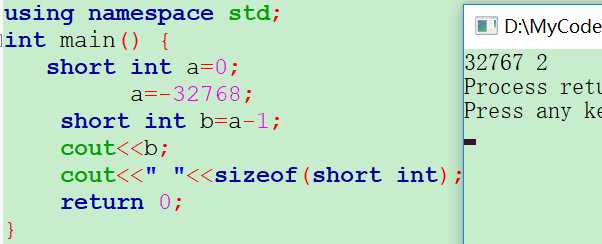PAT 1065 A+B and C[大数运算][溢出]
Posted bluebluesea
tags:
篇首语:本文由小常识网(cha138.com)小编为大家整理,主要介绍了PAT 1065 A+B and C[大数运算][溢出]相关的知识,希望对你有一定的参考价值。
1065 A+B and C (64bit)(20 分)
Given three integers A, B and C in [?2?63??,2?63??], you are supposed to tell whether A+B>C.
Input Specification:
The first line of the input gives the positive number of test cases, T (≤10). Then T test cases follow, each consists of a single line containing three integers A, B and C, separated by single spaces.
Output Specification:
For each test case, output in one line Case #X: true if A+B>C, or Case #X: false otherwise, where X is the case number (starting from 1).
Sample Input:
3
1 2 3
2 3 4
9223372036854775807 -9223372036854775808 0
Sample Output:
Case #1: false
Case #2: true
Case #3: false题目大意:给出三个数,判断前两个数的和是否>第三个数,数是非常大的,需要用字符串来处理的。
//这里需要认真学习大数加法与大数乘法的套路。
//看了题解之后,才发现根本不是,long long就是2^64!!!
//这个为溢出问题,
代码来自:https://www.liuchuo.net/archives/2023
#include <cstdio> using namespace std; int main() { int n; scanf("%d", &n); for(int i = 0; i < n; i++) { long long a, b, c; scanf("%lld %lld %lld", &a, &b, &c); long long sum = a + b; if(a > 0 && b > 0 && sum < 0) {//此时产生溢出,A+B>C printf("Case #%d: true ", i + 1); } else if(a < 0 && b < 0 && sum >= 0){//产生溢出,说明64位表示不了这么小的数, printf("Case #%d: false ", i + 1);//那么一定是小于。 } else if(sum > c) {//其他为正常情况 printf("Case #%d: true ", i + 1); } else { printf("Case #%d: false ", i + 1); } } return 0; }
//我发现我很不理解,这个表示范围的问题,所以学习了一下:https://blog.csdn.net/y12345678904/article/details/52854230#commentBox
对于int 来说,4个字节,32位,有一位是符号为,那么它表示的数的范围就是(-2^31,2^31-1)。
右边的很好理解,比如4位,除去一位符号位,最大正数能表示7,(2^3-1).
那么对于最小数呢?由于负数在计算机中是用补码(原码取反+1)来存的,
-1的原码:1000 0000 0000 0000 0000 0000 0000 0001;
-1的补码:1111 1111 1111 1111 1111 1111 1111 1111;
-2147483647(-2^31+1)原码:1111 1111 1111 1111 1111 1111 1111 1111;
-2147483647补码:1000 0000 0000 0000 0000 0000 0000 0001;
但是!零有二进制中+0和-0两种形式:
+0原码为:0000 0000 0000 0000 0000 0000 0000 0000;
-0原码为:1000 0000 0000 0000 0000 0000 0000 0000;
那么就将-0拿来作为了-2^31,所以就是这么来的!
-2147483648的补码表示为1000 0000 0000 0000 0000 0000 0000 0000,在32位没有原码。
注意,这个补码并不是真正的补码,真正的补码(原码也是这个)是1 1000 0000 0000 0000 0000 0000 0000 0000,溢出(已经多了一位1,!不是32位能表示的了!)。
溢出情况:https://blog.csdn.net/diffjd/article/details/72835698
比如1字节为例:
正数区间:0000 0001 ~ 0111 1111 (1~127)
负数区间:1000 0000 ~ 1111 1111(-1~-127)
并且规定将-0表示为-128,那么如果最大整数超过产生溢出怎么办?
写了一个:

对图中a的二进制:0111 1111 1111 1111,此时再加就会超出界限,1000 0000 0000 0000,此时就是溢出了,就变为了负数,
此时:-32768在计算机中的表示就是-0,也就是1000 0000 0000 0000,那么在此基础上再做++运算,在计算机中补码是直接进行加法运算的,
结果就是1000 0000 0000 0001(对应的原码是:1111 1111 1111 1111),对应的十进制就是-32767.
终于搞明白了!
如图中的最后一行三个数:
其中2表示-32767中有两个1,包括符号位1和最后一位1;
其中1表示-32768中有一个1,即符号为的1;
其中16表示-1中有16个1,全为1.

这个运行结果再一次的证明了,会变成整数,是直接进行补码运算的。
//终于搞明白了!
以上是关于PAT 1065 A+B and C[大数运算][溢出]的主要内容,如果未能解决你的问题,请参考以下文章
PAT 1065 A+B and C (64bit) (20)
1065 A+B and C (64bit) (20 分)大数 溢出